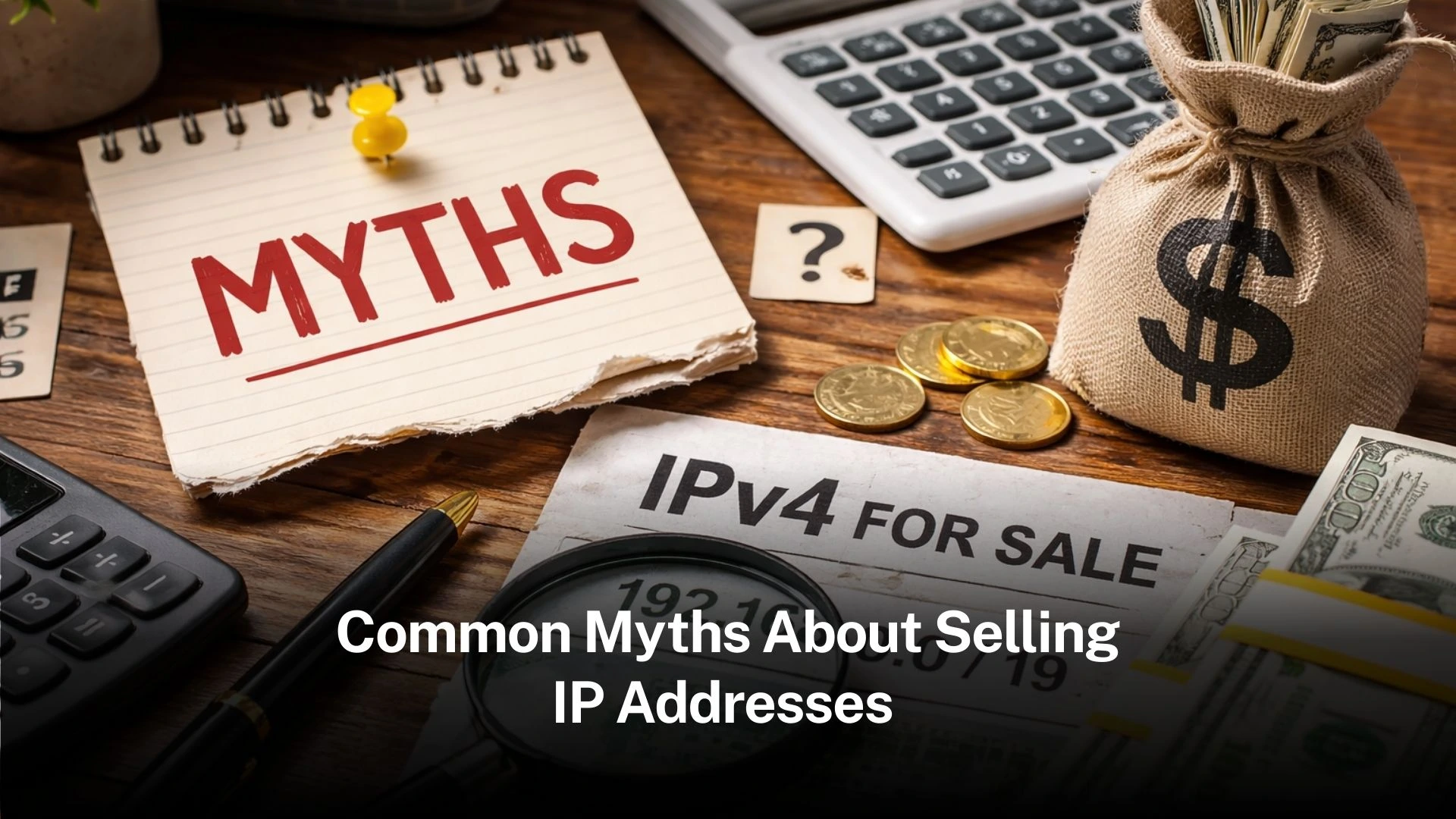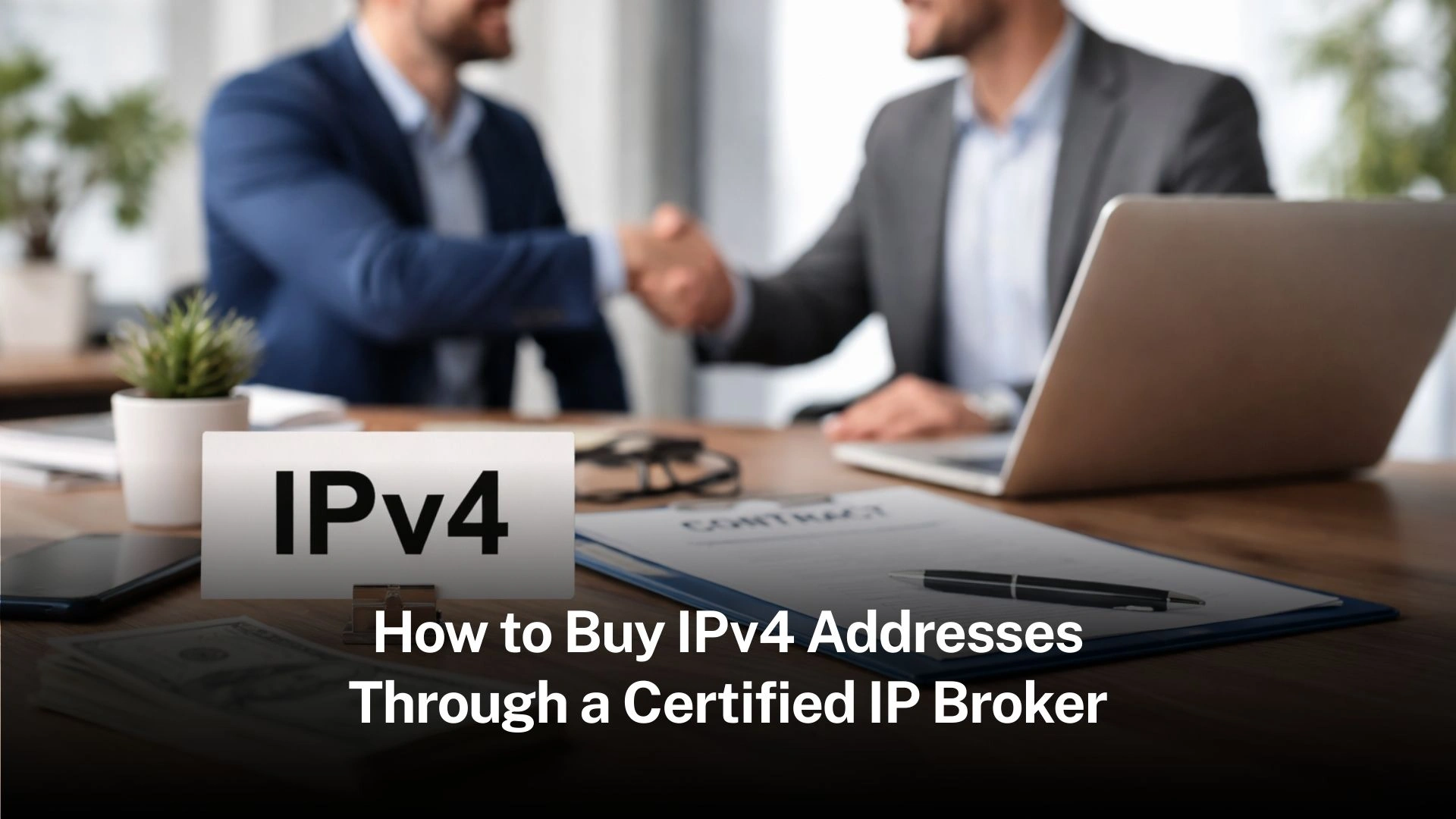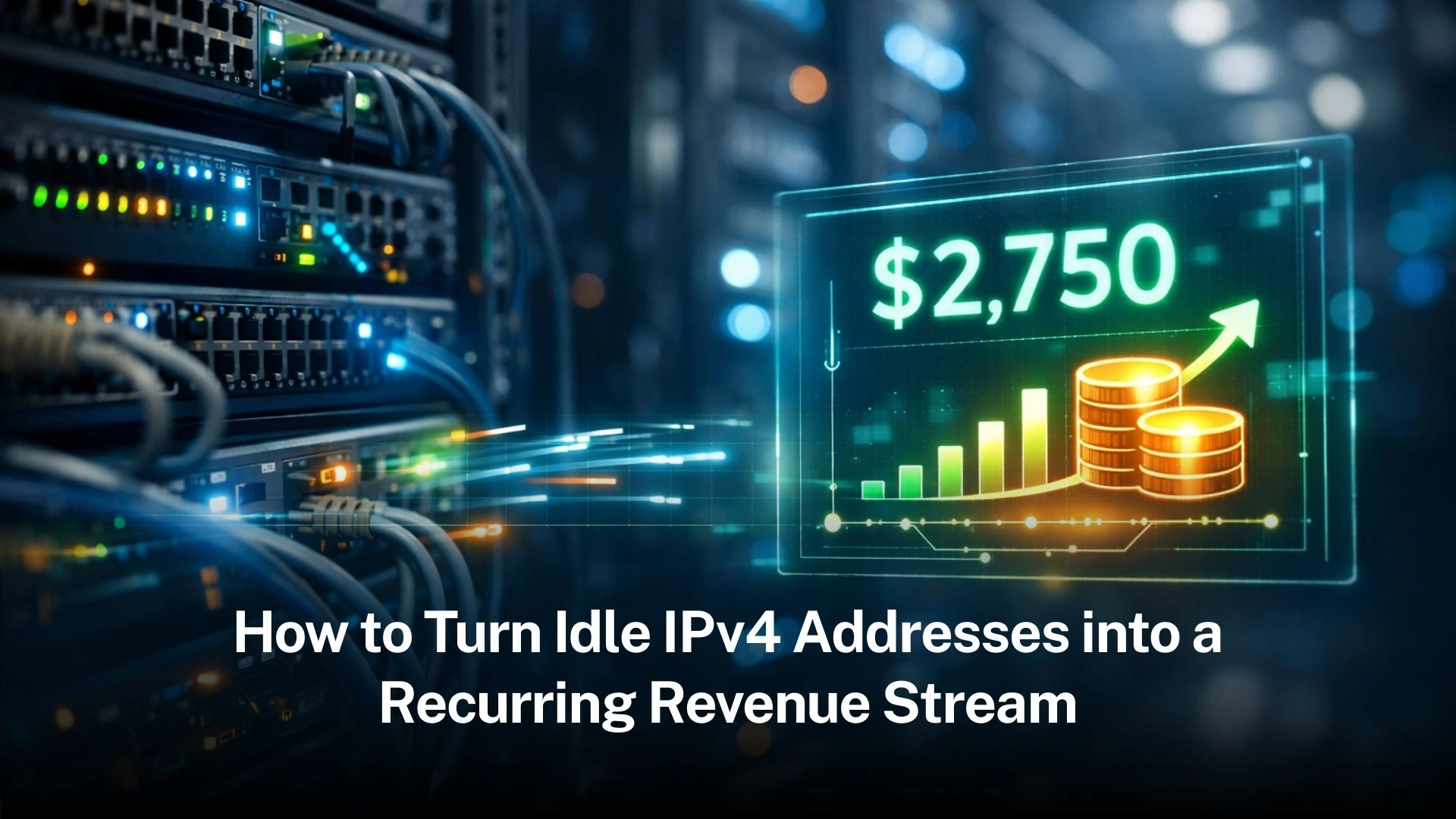Mastering IPv4 Address Leasing: Best Practices

Leasing offers a two-way advantage. For lessors, it is an opportunity to make recurring revenue. For lessees, it is a way to meet their needs for IP addresses without making big financial commitments.
Table of Contents
There are some best practices and pitfalls that come with IP address leasing. These will be discussed later on.
For us to have a better picture on the idea of IPv4 leasing, it’s important to take a look back to how it started.
1.0 When did the leasing of unused IP addresses start?
In 1988, the Internet Assigned Numbers Authority (IANA) was entrusted with the task of distributing IP addresses. Subsequently, from 1992 to 2004, five Regional Internet Registries (RIRs) emerged to exercise greater control over the allocation of new IP addresses to Local Internet Registries (LIRs) within five distinct geographic regions.
In 2011, IANA officially allocated the final remaining blocks of unused IPv4 addresses. The RIRs also rapidly depleted their unused resources. Presently, both IANA and the RIRs primarily focus on reclaiming and reallocating dormant IP addresses.
Nevertheless, the procedures are stringent, and most companies can only request small IP address blocks periodically, resulting in months or even years of waiting.
Despite the depletion of IPv4 addresses, the expansion of the internet persists. Approximately 20% of the entire IPv4 pool remains unused, held by IP address holders from the 1980s and 1990s, who are reluctant to release their unused assets. Instead, they opt to sell them. The IPv4 market took off in the early 2010s when major companies like Microsoft and Google initiated the acquisition of IPv4 space.
Today, prominent corporations, particularly Amazon, continue to acquire IPv4 addresses at substantial costs. Smaller ISPs may not compete with the buying power of these hyperscalers, but they now have the option to lease IP address blocks.
2.0 Key factors contributing to the rise of the IPv4 lease market
1. Depletion of the IPv4 address pool due to increasing internet users.
2. Slower-than-expected adoption of IPv6 as a replacement for IPv4.
3. High demand and limited supply causing inflated buying and selling prices.
4. Major internet providers securing unused IPv4 addresses at high prices, making it difficult for smaller companies to compete.
3.0 IP Leasing Strategy
The market for buying and selling IPv4 assets continues to thrive. The market price of an IP address can hit anywhere from $35 to $50. This means that a company with an excess of hundreds of thousands of IP addresses could potentially generate millions of dollars by putting their surplus addresses up for sale.
However, companies can achieve even higher profits through IP address leasing. The key lies in the greater yield gains achievable in the global IP market, which currently averages around 25%.
Assuming an average selling price of $30 per IP address for specific quantities of subnets, which are commonly traded, a company could boost its revenue by 43% by opting for leasing, even though it may initially seem like a less lucrative choice.
Leasing has historically taken a backseat to selling, with critics finding the process cumbersome due to a lack of transparency in comparison to the sales process. However, the market has matured, and the leasing process now resembles traditional sales processes more closely.
These days, it only takes a few minutes for IP owners to set the price and manage the lease. A reputable broker like i.lease can deal with aspects such as IP reputation and abuse management.
Further innovations are in progress. Among them, brokers are developing infrastructure to minimize the back-and-forth interactions between IP holders and Internet registries.
4.0 Lease Pitfalls to Avoid When Making Your First Transaction
While leasing offers its advantages, there are some pitfalls that can affect both the lessor and the lessee. These are a few things to keep in mind:
The lessor may require the addresses before the lease term expires.
Lessees might need the addresses for a longer duration than initially anticipated.
Malicious or Negligent Lessees: In some cases, lessees with malicious intentions may use the addresses spam or dubious activities. This could lead to websites blacklisting traffic from these addresses.
If you intend to lease IPv4 addresses, take the time to ensure that you are getting those assets from legitimate IPv4 brokers.
5.0 Closing Thought
IP address leasing comes with potential risks, both for the lessor and the lessee. A reputable IP address broker can help mitigate such risks. Contact i.lease today to get professional guidance on IP address leasing.
Related Article
Related Posts

Common Myths About Selling IP Addresses
The IPv4 secondary market is often shrouded in mystery, leading many organizations to sit on valuable digital assets because they fear the perceived complexity or legal “gray areas.” As IPv4 exhaustion becomes a permanent reality, the value of these addresses has skyrocketed, yet misconceptions continue to stall potential transactions. At i.lease, powered by the real-world expertise of LARUS, we’ve seen how these myths prevent companies from unlocking significant capital.Read more Related Posts Common Myths About Selling IP Addresses The IPv4 secondary market is often shrouded in mystery, leading many organizations to sit on valuable digital assets because they Read more How to buy IPv4 addresses through a certified IP broker Buying IPv4 space requires policy compliance, verified need, and registry approval, making certified IP brokers essential guides through complex global Read more What happens when IP resources are mismanaged Poor IP resource management can lead to outages, security breaches, blacklisting, legal exposure and reputational damage across networks and business Read more .related-post {} .related-post .post-list { text-align: left; } .related-post .post-list .item { margin: 5px; padding: 10px; } .related-post .headline { font-size: 18px !important; color: #999999 !important; } .related-post .post-list .item .post_thumb { max-height: 220px; margin: 10px 0px; padding: 0px; display: block; } .related-post .post-list .item .post_title { font-size: 16px; color: #3f3f3f; margin: 10px 0px; padding: 0px; display: block; text-decoration: none; } .related-post .post-list .item .post_excerpt { font-size: 13px; color: #3f3f3f; margin: 10px 0px; padding: 0px; display: block; text-decoration: none; } @media only screen and (min-width: 1024px) { .related-post .post-list .item { width: 30%; } } @media only screen and (min-width: 768px) and (max-width: 1023px) { .related-post .post-list .item { width: 90%; } } @media only screen and (min-width: 0px) and (max-width: 767px) { .related-post .post-list .item { width: 90%; } }

How to buy IPv4 addresses through a certified IP broker
Buying IPv4 space requires policy compliance, verified need, and registry approval, making certified IP brokers essential guides through complex global transfers. IPv4 transactions are regulated transfers, not simple purchases — registries must approve documentation, justification and registration changes. Certified brokers reduce risk and delay by aligning buyers with registry policy, routing legitimacy and cross-region requirements. Why companies still need to buy IPv4 addresses The global supply of IPv4 addressesRead more Related Posts Common Myths About Selling IP Addresses The IPv4 secondary market is often shrouded in mystery, leading many organizations to sit on valuable digital assets because they Read more How to buy IPv4 addresses through a certified IP broker Buying IPv4 space requires policy compliance, verified need, and registry approval, making certified IP brokers essential guides through complex global Read more What happens when IP resources are mismanaged Poor IP resource management can lead to outages, security breaches, blacklisting, legal exposure and reputational damage across networks and business Read more .related-post {} .related-post .post-list { text-align: left; } .related-post .post-list .item { margin: 5px; padding: 10px; } .related-post .headline { font-size: 18px !important; color: #999999 !important; } .related-post .post-list .item .post_thumb { max-height: 220px; margin: 10px 0px; padding: 0px; display: block; } .related-post .post-list .item .post_title { font-size: 16px; color: #3f3f3f; margin: 10px 0px; padding: 0px; display: block; text-decoration: none; } .related-post .post-list .item .post_excerpt { font-size: 13px; color: #3f3f3f; margin: 10px 0px; padding: 0px; display: block; text-decoration: none; } @media only screen and (min-width: 1024px) { .related-post .post-list .item { width: 30%; } } @media only screen and (min-width: 768px) and (max-width: 1023px) { .related-post .post-list .item { width: 90%; } } @media only screen and (min-width: 0px) and (max-width: 767px) { .related-post .post-list .item { width: 90%; } }

How to turn idle IPv4 addresses into a recurring revenue stream with iLease
Unlock the hidden value of unused IPv4 addresses with iLease, turning dormant digital infrastructure into a recurring revenue stream while navigating market demand, compliance and risk. Leasing idle IPv4 blocks can generate steady, long-term income without relinquishing ownership. Platforms like i.lease global IPv4 marketplace make it easier to monetise addresses and manage reputation and compliance. why IPv4 addresses still matter Despite the long-anticipated exhaustion of the IPv4 address space — aRead more Related Posts Common Myths About Selling IP Addresses The IPv4 secondary market is often shrouded in mystery, leading many organizations to sit on valuable digital assets because they Read more How to buy IPv4 addresses through a certified IP broker Buying IPv4 space requires policy compliance, verified need, and registry approval, making certified IP brokers essential guides through complex global Read more What happens when IP resources are mismanaged Poor IP resource management can lead to outages, security breaches, blacklisting, legal exposure and reputational damage across networks and business Read more .related-post {} .related-post .post-list { text-align: left; } .related-post .post-list .item { margin: 5px; padding: 10px; } .related-post .headline { font-size: 18px !important; color: #999999 !important; } .related-post .post-list .item .post_thumb { max-height: 220px; margin: 10px 0px; padding: 0px; display: block; } .related-post .post-list .item .post_title { font-size: 16px; color: #3f3f3f; margin: 10px 0px; padding: 0px; display: block; text-decoration: none; } .related-post .post-list .item .post_excerpt { font-size: 13px; color: #3f3f3f; margin: 10px 0px; padding: 0px; display: block; text-decoration: none; } @media only screen and (min-width: 1024px) { .related-post .post-list .item { width: 30%; } } @media only screen and (min-width: 768px) and (max-width: 1023px) { .related-post .post-list .item { width: 90%; } } @media only screen and (min-width: 0px) and (max-width: 767px) { .related-post .post-list .item { width: 90%; } }